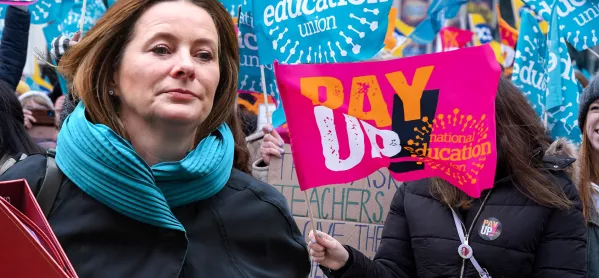Education secretary Gillian Keegan has been told she has been “put on notice” to come up with a new pay offer to avoid a repeat of today’s teacher strike.
The NEU teaching union held the first of seven planned strike days today as teachers in England and Wales took part in industrial action leading to the widespread closure and partial closure of schools.
In a joint statement about the action today, the union’s joint general secretaries, Dr Mary Bousted and Kevin Courtney, accused the government of short-changing teachers for a decade.
They said: ”Gillian Keegan, in her continued refusal to take on board the concerns of teachers and support staff, is letting this generation of children down. The government needs to invest in education.”
The general secretaries added: “Today, we put the education secretary on notice. She has until our next strike day for England, 28 February, to change her stance. NEU members do not want to go on strike again.”
This year’s pay increase for teachers outside of London range from 8.9 per cent for early career teachers, to reach £28,000 in their first year of teaching, to 5 per cent for teachers at the top of the main scale and on the upper pay scale to reach £38,810 and £43,685 respectively.
But earlier today, Ms Keegan said that 40 per cent of classroom teachers would also get “progression pay”, meaning that this year “40 per cent would get up to 15.9 per cent, and, of course, that’s on top of a package that includes 23.6 per cent employer contributory pensions”.
Ms Keegan added: “Everybody taking these very simplistic percentage figures [to explain how pay has fallen or risen] forgets the progression pay, which there is with the bands of a lot of the public sector who are on strike at the moment.”
The NEU general secretaries’ statement this afternoon said union members wanted “constructive talks that deal directly with the long-standing concerns they experience in their schools”.
But it added: “However, be in no doubt that our members will do whatever it takes to stand up for education, including further strike action if Gillian Keegan still fails to step up with concrete and meaningful proposals.”
The NEU has said that its research suggested that 85 per cent of schools had been affected by the strike action.
Dr Bousted and Mr Courtney added: “This is no cause for celebration, but an indication of the level of anger among our members. It is a huge statement from a determined membership who smashed through the government’s thresholds that were only ever designed to prevent strike action happening at all.”
Department for Education data published today found that 45.9 per cent of schools were estimated to be fully open, while 44.7 per cent were open but restricting attendance and 9.3 per cent were closed.
This is based on around 16,400 (77 per cent of) state schools in England that submitted attendance data to the DfE today.




